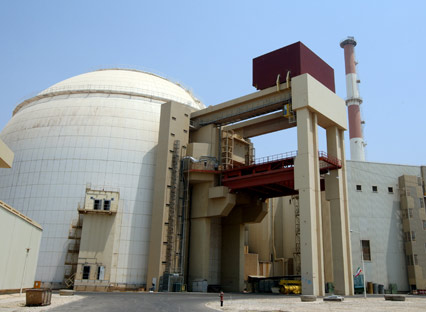Why Iran has violated part of the 2015 nuclear deal
Further breaches expected as Tehran presses to increase trade with Europe

A free daily email with the biggest news stories of the day – and the best features from TheWeek.com
You are now subscribed
Your newsletter sign-up was successful
Iran has breached the limit on its stockpile of enriched uranium set under a 2015 nuclear deal with world powers, the International Atomic Energy Agency has announced.
The global watchdog says its inspectors have confirmed that the 300kg (660lb) cap had been exceeded. Tehran had earlier announced it was breaching the deal by allowing its stockpile of low-enriched uranium to exceed 300kg (660lbs). Iran once had 10,000kg of higher-enriched uranium.
“Based on what I have been told, Iran has exceeded the 300kg limit in accordance with its plan,” Iranian Foreign Minister Mohammad Javad Zarif said on Monday afternoon.
The Week
Escape your echo chamber. Get the facts behind the news, plus analysis from multiple perspectives.

Sign up for The Week's Free Newsletters
From our morning news briefing to a weekly Good News Newsletter, get the best of The Week delivered directly to your inbox.
From our morning news briefing to a weekly Good News Newsletter, get the best of The Week delivered directly to your inbox.
“We have clearly said what we will do and we will act accordingly. We deem it as part of our rights under the Joint Comprehensive Plan of Action.”
CNN says “the move is thought to be Tehran's first major breach of the accord since US President Donald Trump withdrew from the agreement last year”.
The Guardian predicts the development will “put pressure on Europe to do more to help mitigate the effect of crippling US sanctions”.
Jonathan Marcus, the The BBC’s defence correspondent, said the move “will prompt a crescendo of protest from its more strident critics”.
A free daily email with the biggest news stories of the day – and the best features from TheWeek.com
Marcus added that Tehran has “threatened to increase its level of uranium enrichment to up to 20% from Sunday,” which would enable it to get some 90% of the way towards having material suitable for a bomb. “And that really will set diplomatic alarm bells ringing,” he warned.
European nations have already stated that any violation of the deal would bring consequences. A clause in the deal allows for the re-imposition of multilateral sanctions that were lifted in return for Iran limiting its nuclear activities.
However, leaders in Iran believe that Europe could be pushed to do more to increase trade with Iran, which has collapsed over the past year under the weight of US secondary sanctions.
Reuters pointed out that French, British and German officials had “promised a strong diplomatic response if Iran fundamentally breached the deal”, but added that the “initial European response appeared muted”.
British Foreign Secretary Jeremy Hunt said he was “deeply worried” by the news. “UK remains committed to making deal work and using all diplomatic tools to de-escalate regional tensions,” he wrote on Twitter.
Meanwhile, tensions continue to bubble away between Washington and Tehran. In the two months since Washington tightened its sanctions, Trump has blamed Iran for attacks on ships, and after Iran shot down a US drone, he ordered air strikes in retaliation, only to abort them minutes before impact.
The US President has accused Iran of “playing with fire” with the latest stockpiling of enriched uranium.
-
 Democrats push for ICE accountability
Democrats push for ICE accountabilityFeature U.S. citizens shot and violently detained by immigration agents testify at Capitol Hill hearing
-
 The price of sporting glory
The price of sporting gloryFeature The Milan-Cortina Winter Olympics kicked off this week. Will Italy regret playing host?
-
 Fulton County: A dress rehearsal for election theft?
Fulton County: A dress rehearsal for election theft?Feature Director of National Intelligence Tulsi Gabbard is Trump's de facto ‘voter fraud’ czar
-
 Epstein files topple law CEO, roil UK government
Epstein files topple law CEO, roil UK governmentSpeed Read Peter Mandelson, Britain’s former ambassador to the US, is caught up in the scandal
-
 Iran and US prepare to meet after skirmishes
Iran and US prepare to meet after skirmishesSpeed Read The incident comes amid heightened tensions in the Middle East
-
 Which way will Trump go on Iran?
Which way will Trump go on Iran?Today’s Big Question Diplomatic talks set to be held in Turkey on Friday, but failure to reach an agreement could have ‘terrible’ global ramifications
-
 Israel retrieves final hostage’s body from Gaza
Israel retrieves final hostage’s body from GazaSpeed Read The 24-year-old police officer was killed during the initial Hamas attack
-
 China’s Xi targets top general in growing purge
China’s Xi targets top general in growing purgeSpeed Read Zhang Youxia is being investigated over ‘grave violations’ of the law
-
 Panama and Canada are negotiating over a crucial copper mine
Panama and Canada are negotiating over a crucial copper mineIn the Spotlight Panama is set to make a final decision on the mine this summer
-
 Iran unleashes carnage on its own people
Iran unleashes carnage on its own peopleFeature Demonstrations began in late December as an economic protest
-
 How oil tankers have been weaponised
How oil tankers have been weaponisedThe Explainer The seizure of a Russian tanker in the Atlantic last week has drawn attention to the country’s clandestine shipping network